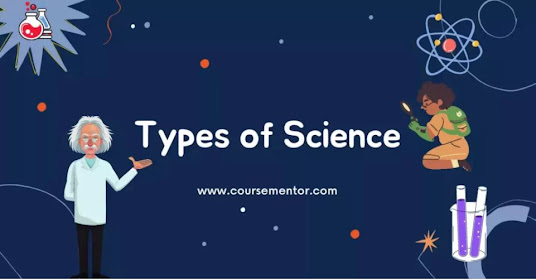TYPES OF SCIENCE – PHYSICAL, LIFE & EARTH FULL INFORMATION
Science is one of the subjects that has helped to solve many of the world's riddles.
And it doesn't end there; our brilliant scientists are already planning to solve other riddles.
But did you know that science is a broad phrase rather than a single word?
When we think about science, we usually only think of two or three subjects: physics, chemistry, biology, or something else.
Is this, however, the end?
No, science is far broader than that; there are many distinct sorts of science that focus on various forms of research.
If you wish to pursue a career in science, you should be aware of these categories.
You will be able to expand your scientific thinking and find the best career for yourself as a result of this.
So, what are these Types of science, or as some refer to them, branches of science? In this blog, I'll tell you.
So, if you're interested in learning more about these fields of research, simply read this blog till the end.
.
What is Science?
Before I go into the meat of the matter, I believe I should first define science.
As I stated in the blog's beginning, science is a broad phrase that is difficult to define in a single sentence.
Different minds define science differently, but the most widely accepted definition is that science is the study of natural law and the physical universe.
Another well-known definition of science is "the acquisition of knowledge about this world or beyond this world via the use of evidence."
Advantages of Science
I'm sure you're aware of the benefits of science, but let's briefly review them in order to boost our confidence in our understanding -:
It helps in the resolution of several world mysteries.
Our lives are made easier by science.
It assists us in comprehending our past and how we are progressing as humans.
We learn more about our home world.
It contributes to the advancement of technology, allowing the entire globe to live more comfortably.
Science has made travelling and communicating much easier.
What are the 3 Main Types of Science?
There are many different types of science, but here are 3 main types:
Physical Sciences
Life Sciences
Earth Sciences
I have also written about other branches of science (I have also covered other branches of science on my blog).
What are three Branches of Science?
Let's talk now about science's branches.
During my research on this topic, I did not find many differences between the various branches and types of science.
I am writing it differently for you to get more information about this topic.
Wikipedia says that science has three branches:
Natural Sciences
Social Sciences
Formal Sciences
Types of Science Jobs
Similarly, there are many kinds of science, so there are many kinds of career options within it.
You probably know about only one or two career opportunities in science if you are a student.
When I was a student, I also thought the same.
The truth is that there are plenty of job opportunities in each type of science.
Top Jobs in Physical Sciences
Physical Scientist
Researcher
Professor
Software Engineer
Computer scientist
Nuclear Technician
Environmentalist
Chemist
Physician
Top Jobs in Life Sciences
Epidemiologists
Biomedical Engineers
Genetic Counselors
Zoologists
Wildlife Biologists
Microbiologists
Chemical Technicians
Biochemists
Biophysicists
Biological Technicians
Top Jobs in Earth Sciences
Marine geologist
Petroleum Engineer
Geochemist
Mining or marine engineer
Groundwater specialist
Environmental scientist
Remote sensing Specialist
Environmental consultant
Conclusion (types of science)
We have come to the end of the blog "types of science".
I have shared with you some important types and branches of science in this blog; I hope you understand them.
Even though I made it as easy as possible, if you have any difficulty or confusion, please let me know in the comments section.
Tell us what you think about this blog; stay in touch with the course mentor for more of this type of content.


Comments
Post a Comment